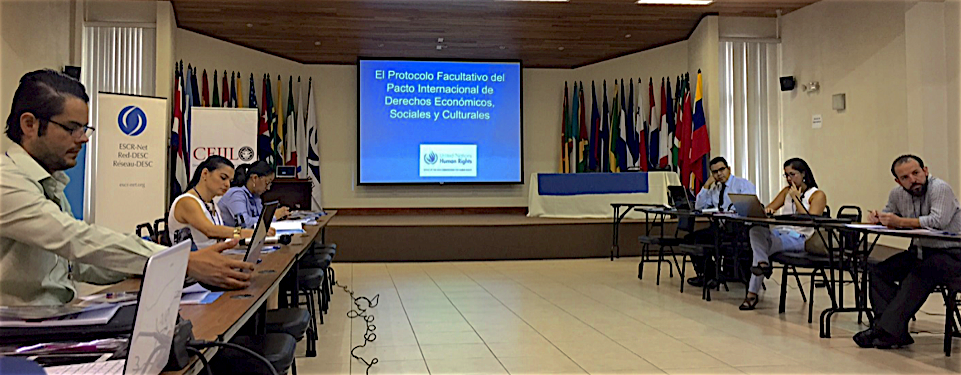The protection of economic, social and cultural rights in Costa Rica
On 27 and 28 April 2016, over 20 human rights experts - including individuals, representatives of human rights organizations, and members of the Office of the United Nations High Commissioner for Human Rights from Costa Rica, Ecuador, El Salvador and Guatemala - gathered in San Jose, Costa Rica, for the workshop "Opportunities for Strategic Litigation Related to Economic, Social and Cultural Rights: the Role of the Optional Protocol to the International Covenant on Economic, Social and Cultural Rights (OP-ICESCR)". The workshop was co-organized by ESCR-Net, CEJIL-Costa Rica, and the Inter-American Institute of Human Rights.
The objectives of the workshop were the following:
- Shared analysis and debate regarding the communications procedure for ESCR violations included under the OP-ICESCR;
- Identification of key factors and openings related to the selection of cases for strategic litigation under the OP-ICESCR; and
- Consolidation of alliances between lawyers, academics, and human rights experts both within Costa Rica, as well as internationally, in order to foster the utilization of the OP-ICESCR.

In addition to systematizing a comparison between the Inter-American system for the protection of human rights and the system used by the UN Committee on Economic, Social and Cultural Rights (UN CESCR) under the OP-ICESCR, participants examined the potential for strategic litigation in relation to two concrete cases: the closure of the Centro de Trasplante Hepático y Cirugía Hepático-Biliar in Costa Rica, and a case on the pineapple industry and the right to water.
In comparing the two systems, participants considered the time frame of the two processes, procedural delimitations, whether decisions are legally binding, political impact within a country, the potential for implementation, the degree of protection of ESCR, among other issues. There was also discussion regarding the record of the Inter-American system in protecting ESCR based on the following: the principle of indivisibility (protection of ESCR in conjunction with civil and political rights), Article 26 of the American Convention, a more expansive vision of reparations, and the Protocol of San Salvador (e.g. the case Gonzales Lluy v Ecuador, decided by the Inter-American Court in 2015).
In relation to specific cases, participants discussed litigation and advocacy strategies to be used domestically (including with the participation of governmental agencies), regionally (the Inter-American system and precautionary measures), and internationally (UN CESCR, shadow/parallel reports, and special rapporteurs).
ESCR-Net is hopeful that this event will serve as a point of departure for more in-depth dialogue regarding the protection of human rights in Costa Rica.
